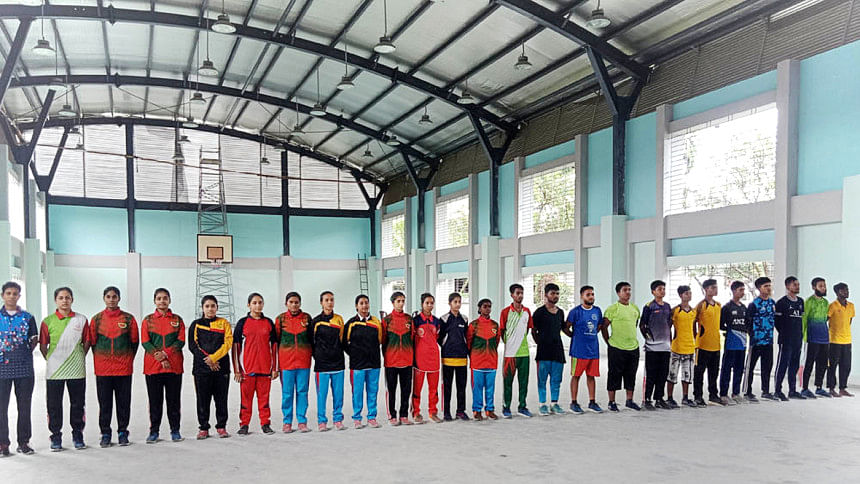Special ones still long for safety net

Following stellar outings at the international circuit, Pabna's special athletes desire to shine in the forthcoming Special Olympics World Summer Games in Germany in 2023. Despite their international success, however, proper measures of bringing them to a mainstream sporting structure have not been executed yet.
In Bangladesh and elsewhere, children with special needs face enormous challenges while battling social constraints, but sports seem to have become an outlet through which these individuals can express themselves and unearth many hidden talents, often neglected, in the process.
Sadia Khan Shetu, who won a gold medal in Floor hockey in the 2017 Special Olympics World Winter Games in Austria, was born as a special child with intellectual disabilities. As a result, she was not treated well in her family from an early age.
The plight of her mother, Aleya, had deepened following the birth of another special child, this time a boy, who also was deaf and could not speak. To add to her miseries further, her husband left the family and remarried.
Despite the hardships and the challenges of raising special children, Aleya now takes pride in her daughter, Shetu, who won another medal in the 2019 Special Olympics World Summer Games in the UAE.
Shetu is now honing her skills in basketball for the upcoming tournament in Germany and has inspired her brother, who is testing his trade in handball, to join as well.
Aleya said, "My children are special children, who never got love and support but they have god-gifted sporting qualities.
"Their glorious performances have now brought happiness in the family as well as in the society."
Mohirunnesa Begum, the mother of Chadni Khatun who won the gold medal in a basketball tournament in UAE, said her daughter now aims to deliver in Germany.
"As a mother of a special child, I was often criticised. My daughter who was often neglected in family and in society now brings the light of hope to my poor family." Mohirunnesa said, adding that no special child should be neglected.
29 special children, who have Down syndrome and are intellectually disabled, are now preparing for the Germany assignment while camping in Pabna under the supervision of the district's Special Olympics body.
Rejaul Hossain Badsha, the director of Bangladesh Special Olympics and the general secretary of the Special Olympics of Pabna sub-chapter, talked to the Daily Star about the preparations of the special players.
"We started training camps earlier this year in Pabna Stadium, roping in 40 children from two schools for special children. We then short-listed 29 special players, including 14 gold medalists for the next World Summer Games in 2023." Badsha informed the Daily Star, while he addressed the challenge behind running year-round camps -- providing sports facilities, and nutrition, among other things -- due to financial constraints.
"We are struggling to continue training camps with local funding. We need government support so that we can expand our program to bring more special children to the facility," Badsha added.
Looking back, Special Olympics Bangladesh's Pabna sub-chapter started its journey in 2010. Since then, the district's special players delivered 14 gold medals, six silver medals, and three bronze medals during Asia Pacific Games (2013), Special Olympic World Games (2015), Winter World Games (2017), and World Summer Games (2019).
Most of these special players come from lower-income families, who can't afford private schools let alone facilitate their children's sporting needs. But the success that these special athletes have brought is giving them the belief to make their lives better.
Konok Khatun, a handball player, told The Daily Star: "Due to our physical disabilities, we have no hope in life. I have found my dream. I want to establish myself as a successful handball player of the country."
Meanwhile, swimming champion Zuthi Akter, who is preparing for another triumph in Germany, expressed her concerns regarding her family's ability to support her.
"I love to swim, I want to continue my career in swimming but my family does not have enough ability," Zuthi said using sign language.
Zuthi and most of the special athletes have the desire to continue their sporting careers but they want to do it professionally. However, these players have no centralised means of income. The only means of financial gains they have achieved so far were courtesy of Prime Minister Sheikh Hasina having handed them prize money following the completion of tournaments.
At the end of day, despite garnering medals and accolades for the country, it's quite unfortunate that these special players have not yet found the financial safety net while Bangladesh still holds the unwanted record for being the most populous country to have never won an Olympics medal.

 For all latest news, follow The Daily Star's Google News channel.
For all latest news, follow The Daily Star's Google News channel. 




Comments